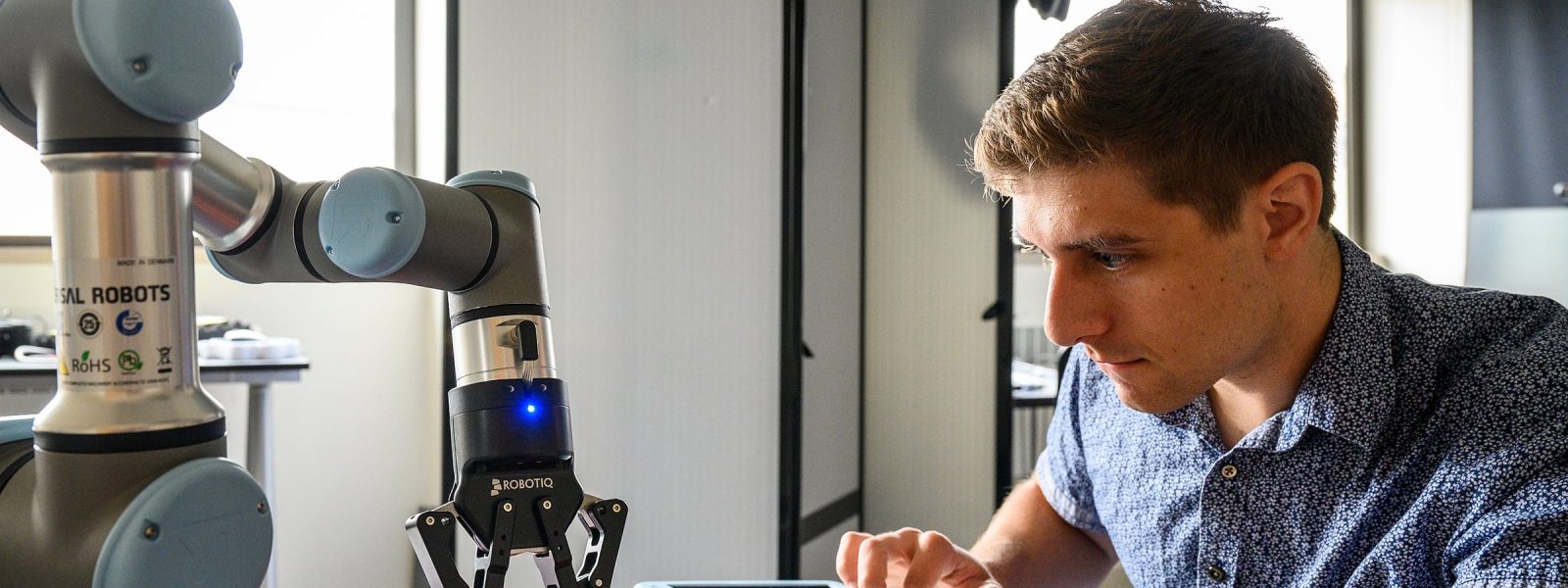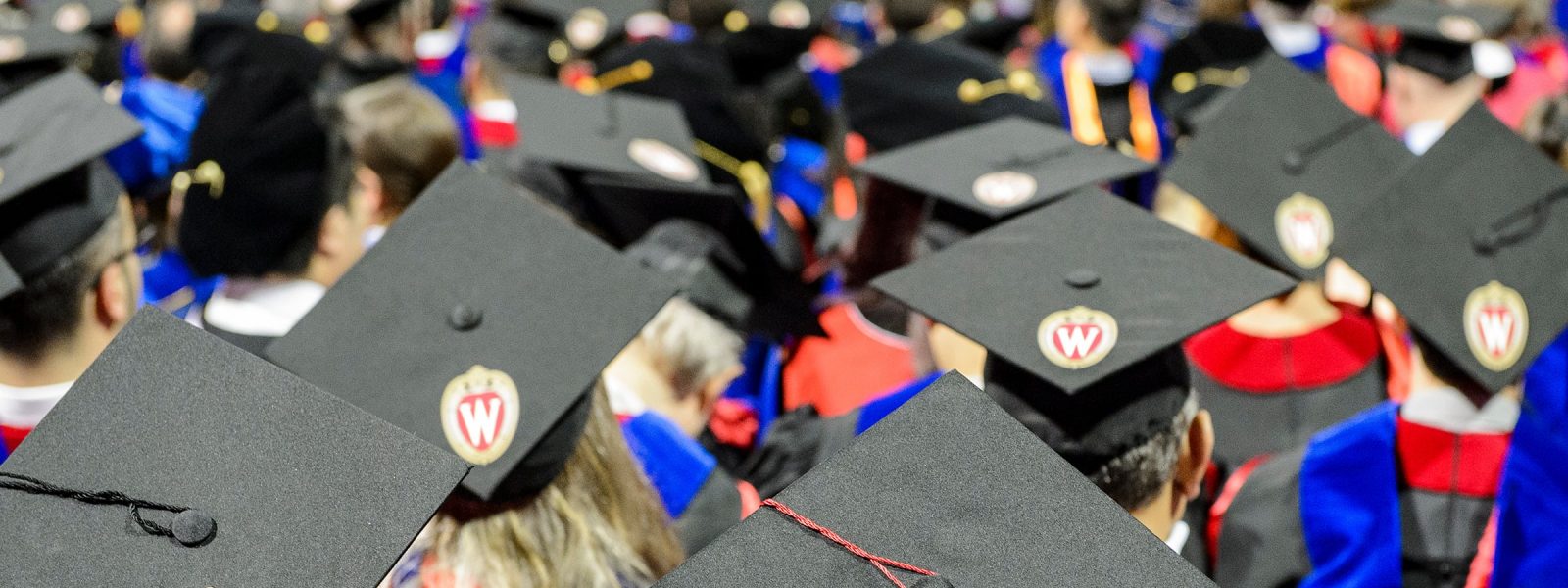Excellence in Research and Scholarship
Provide leadership for discovery, through support of the fearless sifting and winnowing of our world-class research enterprise and the dissemination of knowledge in its many forms.

1. Grow UW–Madison’s research enterprise and expand its global impact, supporting the scholarship of faculty, staff, and students.
Example initiatives:
Top Research University
UW–Madison ranks among the top research universities in the world. As a leader in innovation, the university continues to see increases in its research expenditures. Between July 2019 and June 2020, UW–Madison reported over $1.3 billion in annual research expenditures across all fields.
Data Science Institute
Launched in 2019, the American Family Insurance Data Science Institute performs cutting-edge research in the fundamentals of data science and collaborates with industry partners to apply the work. The institute’s cross-disciplinary research has the potential to advance the burgeoning fields of artificial intelligence, genetics, drug development, and materials science.
OVCRGE Research Funding Programs
The Office of the Vice Chancellor for Research and Graduate Education (OVCRGE) oversees more than a dozen opportunities for research funding. For example, Research Forward helps to fund highly innovative, groundbreaking research at the UW. The initiative prioritizes collaborative research projects that have the potential to fundamentally transform a field of study as well as projects that require significant development or equipment acquisition prior to applying for external funding. Supported by the Wisconsin Alumni Research Foundation, campus initiatives are held each year to invest in new research areas.
Clinical Trials Initiative
The UW has developed clinical and translational science as a distinct discipline. With the establishment of the Institute for Clinical and Translational Research (ICTR), UW scientists are accelerating the process of clinical research—from investigation to discovery to real-life practice. It’s positioning the UW as a leading catalyst of evidence-based policies and practices.
Wisconsin Energy Institute
Led by scientists and engineers across disciplines, the Wisconsin Energy Institute (WEI) fosters research devoted to solving critical issues of how we source and use energy. The Great Lakes Bioenergy Research Center, housed within WEI, recently received a $30 million annual research renewal from the Department of Energy through 2026.

2. Continue to grow faculty and staff research excellence.
Example initiatives:
Fall Research Competition
The OVCRGE provides direct funding annually to dozens of faculty research proposals through the Fall Research Competition. Hundreds of proposals are reviewed by four research committees representing the university’s faculty divisions—biological sciences, physical sciences, social studies, and the arts and humanities.
Professorships and Faculty Recognition
To recognize and encourage faculty excellence, OVCRGE administers prestigious fellowships, named professorships, and mid-career awards. Additionally, UW–Madison provides researchers across all career stages with mentoring and professional development opportunities that emphasize the benefits and challenges of diversity, inclusivity and culture.

3. Provide a modern research support structure that fosters innovation, promotes interdisciplinary collaboration, and drives discovery on future research challenges.
Example initiatives:
Research Core Revitalization
The OVCRGE’s Core Revitalization Program provides an opportunity to upgrade research equipment in UW–Madison shared equipment facilities. The Office of Campus Research Cores coordinates shared equipment, technologies, training, data, and other services. The effort is saving costs and boosting productivity across UW–Madison’s research enterprise.
Enhance Library Collections
Greater investment in Libraries collections strengthen campus research capacities. This includes the Library Collections Enhancement Initiative supported by the Wisconsin Alumni Research Foundation and VCRGE; increased expenditures to regain ground lost to research library peers; and commitment to preservation quality conditions for primary sources and fragile materials.
Multidisciplinary Research Centers and Institutes
VCRGE provides an administrative home for several multidisciplinary research centers and institutes, encompassing the natural sciences, social sciences, and arts and humanities. They generate more than $160 million in extramural research awards annually and bolster graduate education and outreach.
Industry-Sponsored Research
Partnerships between industry and the UW support critical faculty research, lead to new technologies and discoveries, bring products to market faster, and create future job opportunities for students. The UW Office of Business Engagement (OBE) was established to serve as the central campus liaison for businesses. Working with OVCRGE, schools and colleges, OBE also helps to connect industry to potential research partners on campus.
Wisconsin Institute for Discovery
The Wisconsin Institute for Discovery (WID) is a state-of-the-art research institute that fosters interdisciplinary scientific collaboration among faculty from dozens of UW departments. With a focus on interdisciplinary fields like data science, precision medicine, and emerging technologies, WID serves as a centralized hub for cross-campus research teams and hosts forums promoting inquiry. It is complimented by the private Morgridge Institute for Research. The private-public collaboration helps facilitate discoveries to advance health and well-being.
Research Computing and Data
In response to the rapidly changing needs of campus researchers, UW–Madison started the Research Cyberinfrastructure Initiative. The Vice Chancellor for Research and Graduate Education and Chief Information Officer (CIO) are leading this effort to expand and update UW–Madison’s research cyberinfrastructure resources, in collaboration with the Research Technology Advisory Group (RTAG), the Libraries, and other groups on campus. In addition, Research Data Services (RDS) is an interdisciplinary organization committed to advancing research data management and equipping researchers with the tools and resources that support their efforts to store, analyze and share data.

4. Ensure the continued vitality, competitiveness, and strength of our graduate and professional programs.
Example initiatives:
Graduate Assistant Investment
The UW is committed to recruiting the top graduate students nationally and globally. With competitive compensation packages, the university is investing in more than 5,100 graduate students who hold campus appointments, such as teaching, project, and research assistantships. Graduate assistants receive a monthly stipend and, for those with at least a 33 percent appointment, most are eligible for free tuition and comprehensive benefits.
Graduate Research Scholar Communities
The UW’s schools and colleges have created Graduate Research Scholar (GRS) communities and fellowships to support underrepresented students. GRS communities offer a range of social, academic, professional development, and research-related activities related to their discipline.
A Top Producer of PhDs
The UW granted the eighth-most doctorates among U.S. institutions in 2020, the most recent year of data available from the Survey of Earned Doctorates. More than 80 percent of graduating doctoral students rated their UW graduate program and academic experience as excellent or very good.
Delta Program in Research, Teaching and Learning
The Delta Program in Research, Teaching and Learning, located administratively within the Graduate School, provides professional development to advance the skills of future faculty to become inclusive and effective teachers and research mentors. The Delta Program is a member of the Center for the Integration of Research, Teaching and Learning (CIRTL), a network of 42 research universities, administered at UW–Madison. CIRTL aims to develop a national faculty committed to implementing and advancing effective teaching practices for diverse student audiences.